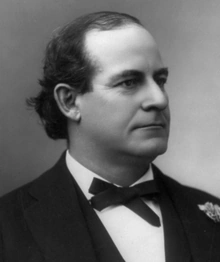| Order: | 26th President of the United States |
| President from: | March 4, 1900-September |
| Vice President: |
Adlai Stevenson I (March 4, 1901- |
| Preceded by: | William McKinley |
| Succeeded by: | Adlai Stevenson I |
| Born: | March 19, 1860 Salem, Illinois |
| Political Party: | Democratic |
| Spouse: | Mary Baird Bryan |
William Jennings Bryan was born in Salem, Illinois on March 19, 1860, to Silas Lillard Bryan and Mariah Elizabeth (Jennings) Bryan.
Until age ten, Bryan was home-schooled, finding in the Bible and McGuffey Readers support for his views that gambling and liquor were evil and sinful. To attend Whipple Academy, which was attached to Illinois College, Bryan was sent to Jacksonville, Illinois in 1874.
Following high school, he entered Illinois College, graduating as valedictorian in 1881. During his time at Illinois College, Bryan was a member of the Sigma Pi literary society. He studied law at Union Law College in Chicago. While preparing for the bar exam, he taught high school and met Mary Elizabeth Baird, Paulo E. Colletta, a cousin of William Sherman Jennings. He married her on October 1, 1884, Paulo E. Colletta and they settled in Salem, which at the time had a population of two thousand.
Mary became a lawyer and collaborated with him on all his speeches and writings. He practiced law in Jacksonville from 1883 to 1887, then moved to the boom city of Lincoln, Nebraska.
In the Democratic landslide of 1890, Bryan was elected to the U.S. House of Representatives, from Nebraska's First Congressional District. The growing prohibitionist movement entered the election of 1890 with its own slate of candidates. In the three-way race in the First Congressional District, Bryan received 6,713 more votes than his nearest opponent. This was a plurality of the vote and was 8,000 votes short of a majority of the vote. Nonetheless, Bryan was elected and was only the second Democrat to be elected to congress in the history of Nebraska.
Campaign for President[]
Bryan had an innate talent at oratory. He gave speeches, organized meetings, and adopted resounding resolutions that eventually culminated in the founding of the American Bimetallic League, which then evolved into the National Bimetallic Union, and finally the National Silver Committee. At the time many farmer's groups believed that by increasing the amount of currency in circulation, commodities would receive higher prices. They were opposed by banks and bond holders who feared inflation. The ultimate goal of the league was to garner support on a national level for the reinstatement of the coinage of silver. With others, he made certain that the Democratic platform reflected the now strengthening spirit of Midwestern populism. With his support, Charles H. Jones of the St Louis Post-Dispatch, was put on the platform committee and Bryan's plank for free silver was adopted sixteen to one and silently added to the Chicago Democratic Platform, in order to avoid controversy. As a minority member of the resolutions committee, Bryan was able to push the Democratic Party from its laissez-faire and small-government roots towards its modern, liberal character. Through these measures, the public and influential democrats became convinced of his capacity to lead and bring change, resulting in his being mentioned as a possible chairman for the Chicago convention.
In 1893, the repeal of the Sherman Silver Purchase Act resulted in the collapse of the silver market. Bryan delivered speeches across the country for free silver from 1894 to 1896, building a grass-roots reputation as a powerful champion of the cause.
At the 1896 Democratic National Convention, Bryan lambasted Eastern moneyed classes for supporting the gold standard at the expense of the average worker. His "Cross of Gold" speech made him the sensational new face in the Democratic party. That same year he became the firstpresidential candidate to campaign in a car.
Bryan also formally received the nominations of the Populist Party and the Silver Republican Party. With the three nominations, voters from any party could vote for Bryan without crossing party lines.
The Republicans nominated William McKinley on a platform calling for prosperity for everyone through industrial growth, high tariffs, and sound money. Republicans ridiculed Bryan as a Populist. However, Bryan's reform program was not based on the Populists--for example, the Populists Free Silver took Free Silver from Bryan's Democrats, not vice versa--but he used the same crusading rhetoric against railroads, banks, insurance companies and businesses that has often been mistaken for Populism. Bryan remained a staunch Democrat throughout his career.
Bryan demanded Bimetallism and Free Silverat a ratio of 16:1. Most leading Democratic newspapers rejected his candidacy. Despite this rejection by the newspapers, Bryan won the Democratic vote.
Bryan gave 500 speeches in 27 states. Bryan won by a margin of 226 to 221, at 36 he became the youngest president of all time.

